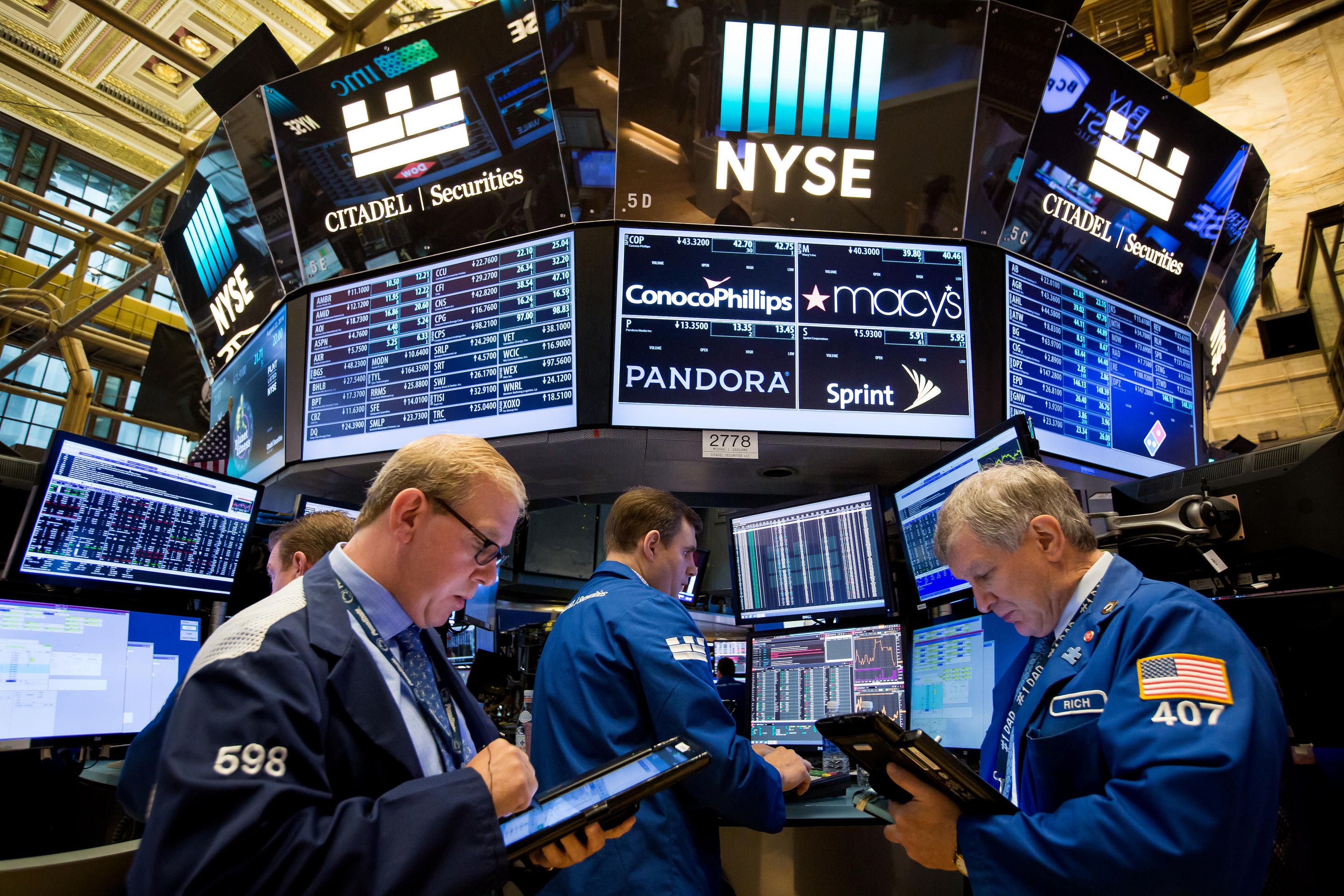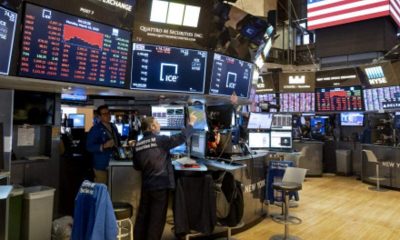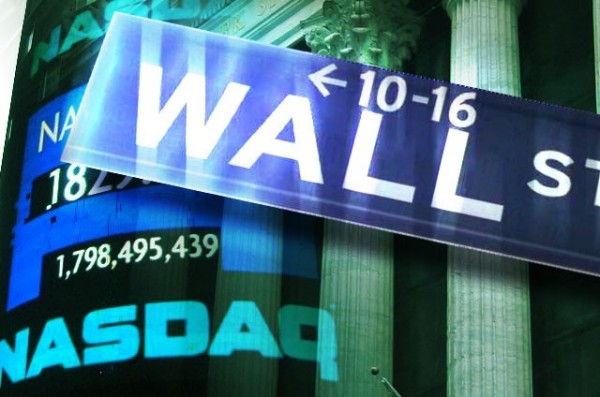Economy
US Stocks Open Lower on Threat Of New Tariffs

By investors Hub
The major U.S. index futures are currently pointing to a lower opening on Friday, with stocks likely to come under pressure after ending the previous session modestly higher.
Trade concerns are likely to weigh on the markets once again after President Donald Trump revealed plans to use tariffs to compel Mexico to make efforts to stop flow of illegal immigrants across the country and into the U.S.
?On June 10th, the United States will impose a 5% Tariff on all goods coming into our Country from Mexico, until such time as illegal migrants coming through Mexico, and into our Country, STOP,? Trump announced in a post on Twitter
He added, ?The Tariff will gradually increase until the Illegal Immigration problem is remedied, at which time the Tariffs will be removed.?
Trump revealed in a subsequent White House statement the tariffs will be raised to 10 percent on July 1st if the crisis persists, with tariffs eventually rising as high as 25 percent by October 1st.
The president argued the sustained imposition of tariffs will produce a massive return of jobs back to U.S., describing the move as an effort to ?firmly and forcefully? stand up for America?s interests.
?We have confidence that Mexico can and will act swiftly to help the United States stop this long-term, dangerous, and deeply unfair problem,? Trump said.
?The United States has been very good to Mexico for many years,? he added. ?We are now asking that Mexico immediately do its fair share to stop the use of its territory as a conduit for illegal immigration into our country.?
The threat of new tariffs on Mexican imports comes amid the escalating trade dispute between the U.S. and China, which has recently weighed on stocks and raised concerns about the global economic outlook.
After failing to sustain an early move to the upside, stocks fluctuated over the course of the trading session on Thursday. The major averages spent a good part of the day bouncing back and forth across the unchanged line.
Eventually, the major averages closed in positive territory but well off their best levels of the day. The Dow rose 43.47 points or 0.2 percent to 25,169.88, the Nasdaq climbed 20.41 points or 0.3 percent to 7,567.72 and the S&P 500 edged up 5.84 points or 0.2 percent to 2,788.86.
The early strength on Wall Street partly reflected bargain hunting following recent weakness, with the Dow bouncing off its lowest closing level in well over three months.
An early rebound by treasury yields also contributed to the upward move, as a recent decline by yields has led to concerns about the outlook for the economy and the possibility of a recession.
Buying interest waned shortly after the start of trading, however, as traders seemed reluctant to get back into the markets due to lingering concerns about the U.S.-China trade dispute.
Amid a continued escalation of the rhetoric, Chinese Vice Foreign Minister Zhang Hanhui accused the U.S. of “economic terrorism” by raising tariffs on Chinese goods.
“We oppose a trade war but are not afraid of a trade war,” Zhang said. “This kind of deliberately provoking trade disputes is naked economic terrorism, economic homicide, economic bullying.”
A report from Bloomberg News indicating China has put purchases of U.S. soybeans on hold has added to concerns about a trade war.
Treasuries also turned higher over the course of the trading session, contributing to a notable downturn by yields.
On the U.S. economic front, the Labor Department released a report showing a modest uptick in first-time claims for U.S. unemployment benefits in the week ended May 25th.
The report said initial jobless claims edged up to 215,000, an increase of 3,000 from the previous week’s revised level of 212,000.
A separate report from the Commerce Department showed U.S. economic growth in the first quarter accelerated by slightly less than initially estimated.
The Commerce Department said real gross domestic product surged up by 3.1 percent in the first quarter, reflecting a slight downward from revision from the previously reported 3.2 percent jump.
The downwardly revised increase in GDP, which matched economist estimates, still represented a notable acceleration from the 2.2 percent growth seen in the fourth quarter of 2018.
Meanwhile, the National Association of Realtors released a report showing pending home sales unexpectedly pulled back in the month of April.
NAR said its pending home sales index tumbled by 1.5 percent to 104.3 in April after surging up by 3.9 percent to an upwardly revised 105.9 in March.
The pullback came as a surprise to economists, who had expected pending home sales to climb by 0.9 percent compared to the 3.8 percent jump originally reported for the previous month.
Most of the major sectors ended the day showing only modest moves, contributing to the lackluster close by the broader markets.
Energy stocks showed a significant move to the downside, however, with a steep drop by the price of crude oil weighing on the sector.
Reflecting the weakness in the energy sector, the NYSE Arca Natural Gas Index tumbled by 2 percent, the Philadelphia Oil Service Index slumped by 1.7 and the NYSE Arca Oil Index fell by 1.3 percent.
Banking stocks also came under pressure over the course of the trading session, dragging the KBW Bank Index down by 1.3 percent.
On the other hand, gold stocks moved higher along with the price of the precious metal, with the NYSE Arca Gold Bugs Index jumping by 1.8 percent.
Economy
Grey to Cut Cross-Border Payment Costs with New USD Offering

By Adedapo Adesanya
A cross-border payments solutions company, Grey has expanded its business banking platform to include US Dollar corporate accounts, bulk international payments, and USDC stablecoin support, all integrated into a single system.
The company is positioning itself as a low-cost, faster alternative to traditional international banking, particularly for businesses in emerging markets as it enables companies to open US Dollar accounts, receive global payments, and send payouts to 170+ countries, including bulk transfers, within minutes.
Grey aims to solve common cross-border payment challenges, particularly the high transfer costs that often range between 6 and 7 per cent of transaction value, prolonged settlement cycles that can stretch across several days, and the limited access many businesses face when trying to open and operate foreign currency accounts. In addition, companies frequently contend with hidden intermediary fees and poor foreign exchange transparency, both of which undermine cost predictability and effective cash flow management.
By integrating USD business accounts and USDC stablecoin functionality into its platform, Grey enhances its value proposition around faster settlement, clearer pricing structures, improved cost efficiency, and broader global accessibility. The expanded capabilities enable businesses to manage international transactions with greater speed, transparency, and operational control.
“Businesses may operate without borders today, but access to reliable global banking remains uneven, particularly for companies in high-growth markets,” said Mr Idorenyin Obong, Co-founder and Chief Executive Officer of Grey. “We’re closing that gap and enabling businesses to move money faster, with greater transparency and control, wherever their clients or partners are based.”
“When payments are delayed, or costs are unpredictable, growth stalls,” added Mr Joseph Femi Aghedo, Chief Operating Officer and Co-founder of Grey. “Grey eliminates those friction points, giving businesses a faster, simpler way to manage payroll, supplier payments, and partner payouts across borders. Adding USD and stablecoin capabilities makes these benefits accessible to even more customers.”
Established in Africa in 2020, Grey has a presence in key markets, including the United States, the United Kingdom, and Europe, and has recently expanded its services and operations into Latin America and Southeast Asia.
Since its inception, the company has consistently enhanced its services to empower digital nomads worldwide, regardless of location. Grey’s offerings include multi-currency accounts, low-cost international money transfers, a virtual USD card, expense management tools, and robust security measures.
Economy
Quidax, Lisk to Unlock Stablecoins, On-chain Financial Opportunities

By Aduragbemi Omiyale
A partnership designed to expand access to stablecoins and on-chain financial opportunities for everyday users and businesses has been entered into between Quidax and Lisk.
The partnership provides a critical gateway for the developer community, as builders on the Lisk network can now leverage Quidax’s robust digital asset infrastructure to access stablecoins and local currencies at competitive rates.
This institutional-grade infrastructure is designed to power “future-forward” financial products, ranging from neobanks and cross-border payment platforms to regional exchanges and global fintech solutions. It will also allow Quidax customers to trade and move value seamlessly using USDT, USDC, LSK, and Ether (ETH) on the Lisk network.
The collaboration will also accelerate the adoption of Web3 solutions that solve real-world financial challenges for millions of customers across Africa by combining Quidax’s deep local liquidity and compliant framework with Lisk’s scalable L2 technology.
In 2024, Quidax became the first crypto exchange to receive a provisional operating license from Nigeria’s Securities and Exchange Commission (SEC).
“The partnership with Lisk enables us to extend our platform to serve more people and cater to the increasing demand from products and services that want to integrate our stablecoin and digital assets product to build products across Africa,” the Chief Infrastructure Officer at Quidax, Mr Morris Ebieroma, said.
Also commenting, the Ecosystem Lead for Africa at Lisk, Ms Chidubem Emelumadu, said, “Africa represents one of the most critical frontiers for blockchain innovation, where the demand for reliable and inclusive financial tools is urgent.
“Our partnership with Quidax expands access to stablecoins and on-chain financial opportunities for everyday users and businesses. At the same time, it gives founders building on Lisk the critical infrastructure they need to create solutions that can scale meaningfully across the continent,” she added.
Economy
Customs Urges Freight Forwarders to Adopt Automated Licence, Permit System

By Adedapo Adesanya
The Nigeria Customs Service (NCS) has urged freight forwarders to adopt its automated Licence and Permits Processing system to reduce the cost of doing business.
This advice was given by the Assistant Comptroller-General of Customs, Mr Muhammed Babadede, during a stakeholders’ engagement on automation held in Lagos on Monday.
He noted that the reform responds to longstanding demands for faster, more transparent and simpler procedures for industry stakeholders, disclosing that Comptroller-General of Customs, Mr Bashir Adeniyi, has approved the full automation of the service’s licences and permits processes.
“For years, stakeholders dealt with paperwork, long queues and uncertainty from manual processing. Those days are coming to an end.
“This sensitisation is across all zones. The goal is to ensure stakeholders understand the automated system before implementation,” Mr Babadede said.
He said automation would enable applications and renewals from offices or mobile phones, eliminating visits to customs formations, assuring stakeholders of a fair and consistent process, and reducing errors associated with manual documentation.
He said automation would improve record-keeping, supervision and service delivery without increasing pressure on officers.
The Deputy Comptroller-General, Tariff and Trade, CK Naigwan, also represented by Mr Babadede, reiterated management’s commitment to seamless implementation.
Meanwhile, the Comptroller of Customs for Licence and Permit Unit, Mrs Ngozika Anozie, praised the Comptroller-General for driving innovation within the Service, saying the automation aligns Customs procedures with global best practice and strengthens institutional efficiency.
According to her, the reform reflects the three-point agenda of the Chairman of the World Customs Organisation, Mr Adeniyi, centred on consolidation, collaboration and innovation.
She said the system would enhance the ease of doing business in the maritime sector and boost national revenue generation.
“Automation will cut business costs and reduce travel risks for stakeholders
“They will no longer travel repeatedly to Abuja, paying for transport, hotels and feeding to process licences and permits,” she said, adding that the platform would automatically reject fake documents and accept genuine submissions, curbing fraudulent practices.
“The CGC is determined to sanitise the system, and we are committed to achieving that objective,” Mrs Anozie said.
On his part, the Assistant Superintendent of Customs, Mr Ibrahim Usman, said the Licence and Permit Unit operates under the Tariff and Trade Department.
He explained that the unit ensures proper issuance of licences and permits and compliance with import regulations.
Mr Usman said all licences and permits expire on December 31 of their issuance year.
He added that the portal would become fully operational after nationwide sensitisation, with stakeholders duly informed.
Customs Area Controller, Tincan Island Command, Mr Frank Onyeka, thanked stakeholders for their continued support.
He urged them to take the exercise seriously to achieve seamless processing across Customs operations.
Stakeholders raised concerns about online payment integration and potential technical disruptions.
Officials addressed the questions and pledged continued engagement to ensure smooth implementation nationwide.
-

 Feature/OPED6 years ago
Feature/OPED6 years agoDavos was Different this year
-
Travel/Tourism10 years ago
Lagos Seals Western Lodge Hotel In Ikorodu
-

 Showbiz3 years ago
Showbiz3 years agoEstranged Lover Releases Videos of Empress Njamah Bathing
-

 Banking8 years ago
Banking8 years agoSort Codes of GTBank Branches in Nigeria
-

 Economy3 years ago
Economy3 years agoSubsidy Removal: CNG at N130 Per Litre Cheaper Than Petrol—IPMAN
-

 Banking3 years ago
Banking3 years agoSort Codes of UBA Branches in Nigeria
-

 Banking3 years ago
Banking3 years agoFirst Bank Announces Planned Downtime
-

 Sports3 years ago
Sports3 years agoHighest Paid Nigerian Footballer – How Much Do Nigerian Footballers Earn















